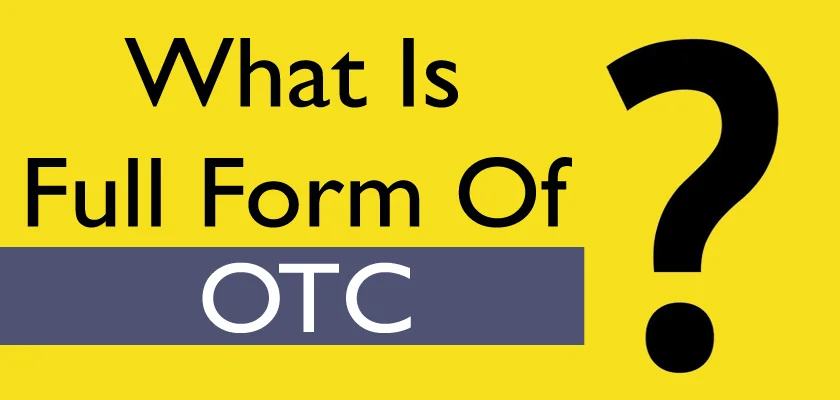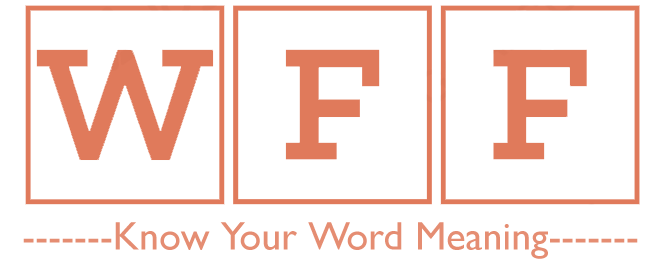Do you know what is the OTC Full Form? The abbreviation OTC stands for ‘over-the-counter’, and it refers to any trade that takes place directly between two parties without the need for a formal exchange or intermediary. It is trading is a well-known term in the finance and investment industries, and it has several interpretations depending on the context.
Table of Contents
What is the OTC Full Form?
This article aims to provide a comprehensive overview of the OTC Full Form, what it means, how it works, and its various applications across different industries. Whether you are an experienced investor or a novice trader, this article will help you gain a better understanding of OTC trading and its significance in the world of finance.
What is the OTC Full Form?
Definition of OTC
When it comes to trading financial securities, OTC stands for Over-The-Counter. OTC trading refers to the practice of buying and selling securities that are not listed on a formal exchange. Instead, OTC securities are traded directly between the two parties involved in the transaction, usually through a dealer network.
Different Types of OTC Securities
The following are different types of OTC securities that are traded:
- Stocks- OTC stocks are traded by small-sized companies that are not eligible for listing on NYSE or Nasdaq. Some well-known big firms are also listed in OTC markets.
- Bonds- Bonds are traded on broker-dealer networks offered by banks and are classified as OTC securities.
- Derivatives- Derivatives are private agreements arranged through a broker and can be forwards, options, futures, or other contracts that depend on the value of an asset such as stocks.
- ADRs- American Depositary Receipts (ADRs) represent a certain number of shares of a foreign stock.
- Foreign Currency- Foreign currencies are traded on the Forex exchange as part of the OTC market.
- Cryptocurrency- Cryptocurrencies like Bitcoin and Ethereum are traded in the OTC market.
Some Most Popular OTC Markets
The following are the most popular OTC markets:
- Pink Sheets- The Pink Sheets is a platform that provides pricing information for OTC securities, and it is primarily used by small companies that are not listed on major exchanges.
- OTCQB Venture Market- The OTCQB Venture Market is designed for early-stage and developing companies that are not yet able to meet the requirements for listing on a national exchange.
- OTCQX Best Market- The OTCQX Best Market is a premium market that is reserved for established and financially sound companies. It is often used by foreign companies that want to have a presence in the US market without having to meet the requirements for listing on a major exchange.
- Grey Market- The Grey Market is a marketplace for securities that are not yet publicly traded, but are available for purchase and sale through private transactions.
- Bitcoin OTC Markets- Bitcoin OTC markets are online platforms where buyers and sellers of bitcoin can trade directly with each other, without the need for a centralized exchange. These markets are often used by high-net-worth individuals and institutional investors who want to buy or sell large amounts of bitcoin without affecting the market price.
- Forex OTC Market- The Forex OTC Market is a decentralized market where traders can buy and sell currencies directly with each other, without the need for a centralized exchange. It is the largest and most liquid market in the world, with daily trading volumes in trillions of dollars.
Advantages and Disadvantages of OTC Trading
Advantages of OTC Trading
One advantage of OTC trading is that it offers more flexibility than exchange-traded securities. Because OTC securities are not subject to the same regulations as exchange-traded securities, they can be customized to meet the specific needs of buyers and sellers. OTC trading can also offer lower transaction costs, particularly for larger transactions.
Disadvantages of OTC Trading
One disadvantage of OTC trading is the lack of transparency. Because OTC securities are not traded on a formal exchange, pricing information is not readily available to the public. This can make it more difficult for investors to determine the true value of a security. Additionally, OTC trading can be riskier than exchange-traded securities, as there is no centralized platform for settling trades or regulating the market.
Regulatory Framework for OTC Trading
Over-the-counter (OTC) trading is a decentralized market in which financial instruments are traded directly between two parties, without the involvement of an exchange. Despite its flexibility and convenience, OTC trading is subject to regulations that govern the conduct of the parties involved, the transparency of transactions, the protection of investors, and the stability of the financial system.
Regulatory Bodies and their Functions
In the United States, OTC trading is mainly regulated by the Securities and Exchange Commission (SEC) and the Commodity Futures Trading Commission (CFTC), which oversees different types of financial instruments, such as securities, derivatives, and commodities. The SEC regulates most OTC securities, such as stocks, bonds, and options, whereas the CFTC regulates OTC derivatives, such as swaps, futures, and options on futures. Other regulatory bodies in the US and abroad may also have a role in OTC trading, depending on the jurisdiction and the nature of the instruments.
Key Points to Remember
– OTC trading is a decentralized market in which financial instruments are traded directly between two parties, without the involvement of an exchange.
– OTC trading is subject to regulations that govern the conduct of the parties involved, the transparency of transactions, the protection of investors, and the stability of the financial system.
– Major Banks and financial institutions are the primary dealers in OTC markets, but retail investors and traders can also participate in OTC trading.
– The future of OTC trading is shaped by technological innovations, regulatory developments, and market dynamics that create new opportunities and challenges for participants.

Other OTC Full Forms List
| Term | Full Form | Category |
| OTC | Over the Counter | Banking |
| OTC | Over-the-counter | Healthcare |
| OTC | Bol | Airport Code |
| OTC | Open Tubular Column | Chemistry |
| OTC | Overflow of Tacho Counter | Computer Assembly Language |
| OTC | Ohio Technical College | Educational Institute |
| OTC | Okefenokee Technical College | Educational Institute |
| OTC | Output Transformer Coupled | Electronics |
| OTC | Off Topic Comments | Messaging |
| OTC | Operational Test Command | Military and Defence |
| OTC | Officer Training Corps | Military and Defence |
| OTC | Officer In Tactical Command | Military and Defence |
| OTC | Optical Telephone Corporation | Stock Exchange |
| OTC | Other Tennis Club | Sports |
| OTC | Olympic Training Center | Sports |
| OTC | On The Clock | Sports |
| OTC | On-going Test Case | Software |
| OTC | Orbiter Test Conductor | Space Science |
| OTC | Office of Technology Commercialization | Technology |
| OTC | One-time Charge | Telecommunication |
| OTC | Operating Telephone Company | Telecommunication |
FAQs- What Is The OTC Full Form?
What is the OTC Full Form?
The OTC Full Form stands for “Over-the-Counter.”
What is OTC trading?
OTC trading refers to the buying and selling of financial instruments directly between two parties without the involvement of an organized exchange.
What is the difference between OTC and exchange-traded securities?
OTC securities are traded directly between two parties outside of a formal exchange, while exchange-traded securities are traded on a centralized exchange where buyers and sellers are matched by an intermediary.
What are some advantages of OTC trading?
OTC trading offers greater flexibility, customization, and confidentiality compared to exchange-traded securities. It also enables investors to access unique markets and products that may not be available on formal exchanges.
What are some of the risks associated with OTC trading?
OTC trading carries higher counterparty risk due to the lack of a centralized exchange and clearinghouse. It can also be more challenging to obtain accurate pricing information and liquidity, and regulatory oversight may be less stringent.
What are the types of financial instruments traded in OTC markets?
The types of financial instruments traded in OTC markets include stocks, bonds, derivatives, ADRs, foreign currency, and cryptocurrencies.
What Is OTC Full Form in Sap?
The SAP OTC (Order-to-Cash) process entails a sequence of interlinked steps designed to streamline the handling of sales transactions within a Business.
What Is OTC Full Form in Hotel?
Order to Cash cycle, commonly abbreviated as OTC or O2C.
What Is OTC Full Form in Flipkart?
Flipkart OTC, which stands for One Time Code, is a numeric code, much like an OTP (One Time Password).
Thanks for reading What is the OTC Full Form? Bookmark our website Whatisfullform.com to know or read our collection of full forms.


